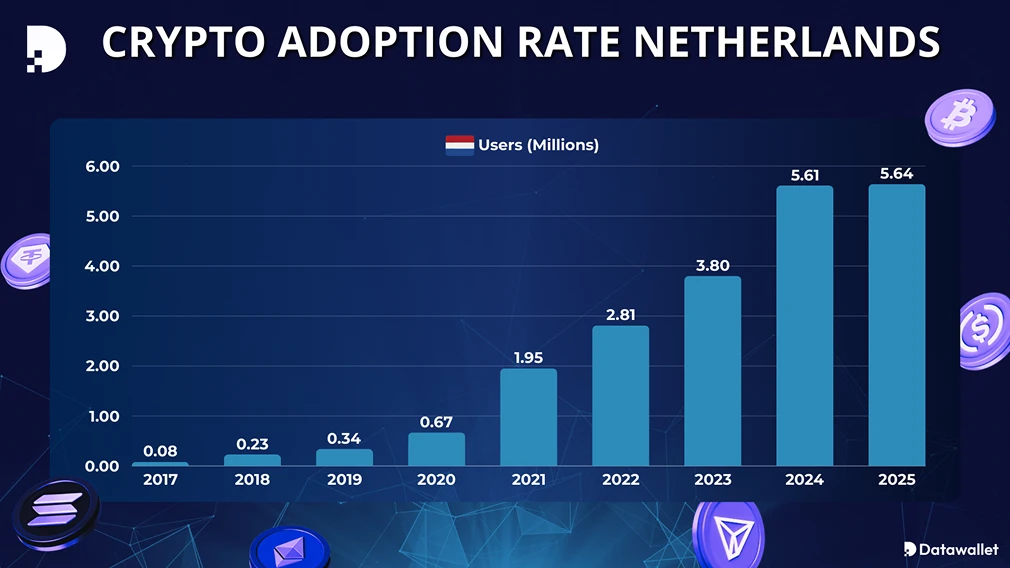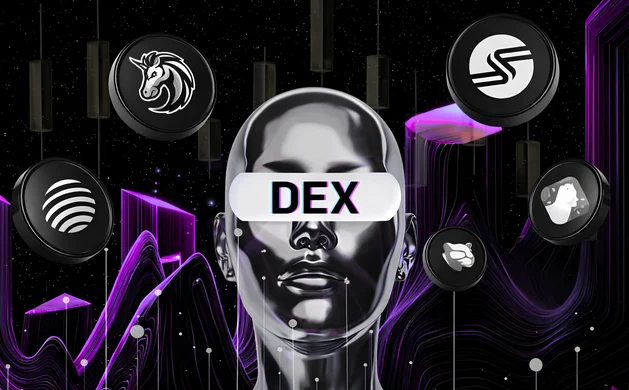Best Crypto Exchanges in the Netherlands
.webp)
Summary: Crypto exchanges in the Netherlands operate under the supervision of the Dutch Authority for the Financial Markets (AFM). As of this year, the EU's Markets in Crypto-Assets Regulation (MiCA) came into full effect, requiring crypto-asset service providers (CASPs) to obtain licenses.
Here are six leading cryptocurrency platforms available to Dutch investors:
Kraken is the best crypto exchange in the Netherlands thanks to its high security, free EUR deposits, regulatory compliance, and a diverse range of digital assets for spot and futures trading.
Licensing & Regulation
Adheres to MiCA regulations across Europe
Supported Assets
400+ Cryptocurrencies
EUR Deposit Methods
SEPA transfer, Bank Wire, Cards & iDEAL
Top Crypto Platforms in the Netherlands
Dutch investors have access to several crypto exchanges, each regulated by the Dutch Authority for the Financial Markets (AFM) and compliant with the European Union's MiCA guidelines. The following table highlights the leading digital asset platforms for investors in the Netherlands and compares their fees, features, security, EUR deposit methods, and supported assets.
1. Kraken
Kraken is the leading crypto exchange for Dutch traders, recognized for its advanced security, deep liquidity, and comprehensive suite of trading tools. Established in 2011, it has evolved into a global platform with over 15 million users, providing Dutch investors with access to 445 digital currencies.
Beginners appreciate Kraken's simplified app experience, easy euro deposits using iDEAL, and educational resources. Experienced traders benefit from Kraken Pro’s advanced features, such as spot trading, margin trading (up to 5x leverage), derivatives markets, and institutional-grade tools.
Security is a top priority for Kraken, with assets stored in cold storage, utilizing industry-leading encryption protocols, and undergoing regular proof-of-reserves audits to ensure transparency. Dutch users can also grow their holdings through staking services offering annual returns of up to 17%.
Platform Highlights:
- Fees: Spot trading fees range between 0.16% and 0.26%, with zero-fee trading available via Kraken+.
- Supported Assets: 440+ cryptocurrencies.
- Regulation & Licensing: Registered as a Virtual Asset Service Provider (VASP) with AFM, compliant with EU MiCA regulations.
- EUR Deposit Methods: iDEAL, SEPA bank transfers, debit/credit cards, Apple Pay, and Google Pay.

2. eToro
eToro is popular for its intuitive and multi-asset investment platform, providing access to cryptocurrencies, stocks, ETFs, and more within a single app. Launched in 2007, it has attracted over 35 million users globally, offering Dutch investors an ideal entry point to the crypto market.
The platform is known for its innovative CopyTrader tool, which enables users to automatically replicate trading strategies from top-performing investors. Additionally, eToro supports trading in more than 70 cryptocurrencies and provides a hassle-free staking service to earn passive crypto rewards.
eToro collaborates with leading global banks to safeguard client funds, implements robust account protections, and adheres strictly to EU regulations under the MiCA framework. It also provides comprehensive educational resources, including courses, webinars, and podcasts.
Platform Highlights:
- Fees: Simple 1% flat fee per crypto trade, no hidden charges.
- Supported Assets: Over 70 cryptocurrencies, plus thousands of global stocks and ETFs.
- Regulation & Licensing: Regulated in Europe and complies with MiCA standards.
- EUR Deposit Methods: iDEAL, SEPA transfers, debit/credit cards, PayPal, Skrill.

3. OKX
OKX is a crypto platform gaining traction among Dutch traders due to its innovative features, extensive asset range, and deep integration with decentralized finance (DeFi). Founded in 2017, it serves millions globally and supports over 350 digital assets for trading on spot and futures markets.
The exchange excels with its diverse trading products, including spot trading, perpetual and expiry futures contracts, and crypto options. Its powerful platform provides access to advanced charts through direct integration with TradingView, allowing traders to capitalize on real-time market insights.
Additionally, the OKX Wallet connects users with DeFi platforms, NFTs, and emerging Web3 projects. Its institutional services offer API connectivity, custom trading strategies, and substantial market depth tailored to professional traders and financial institutions.
Platform Highlights:
- Fees: Spot fees start at 0.1%.
- Supported Assets: 350+ cryptocurrencies
- Regulation & Licensing: Licensed under OKcoin Europe Ltd. (Malta) as a Crypto-Asset Service Provider compliant with MiCA regulations.
- EUR Deposit Methods: Credit/debit cards, SEPA transfers, Apple Pay.

4. Bitvavo
Bitvavo is a leading Dutch cryptocurrency exchange based in Amsterdam, offering a user-friendly platform for buying, selling, and storing over 300 digital assets. Established in 2018, it has become the largest and most competitively priced exchange in the Netherlands.
It provides staking services with up to 15% APY, a recurring buy option for automated investing, and an intuitive mobile app for trading on the go. Security is a priority, with measures like an Account Guarantee that may reimburse up to €100,000 in case of unauthorized access.
For advanced traders, Bitvavo's Pro Mode offers professional-grade tools, including advanced charting, resizable modules, and low fees on USDC pairs. Institutional clients benefit from tailored services, high liquidity euro markets, and reliable banking infrastructure.
- Fees: Trading fees start from 0.25%.
- Supported Assets: 350+ digital assets.
- Regulation & Licensing: Registered with De Nederlandsche Bank (DNB) as a fiat-to-digital asset exchange and hosted wallet provider.
- EUR Deposit Methods: SEPA bank transfers and iDEAL.

5. Binance
Binance is the largest cryptocurrency exchange worldwide, trusted by over 270 million users, and popular among traders in the Netherlands. It offers extensive trading opportunities, listing over 400 cryptocurrencies, including top assets such as Bitcoin, Ethereum, BNB, and Solana.
Dutch traders benefit from Binance’s comprehensive suite of products, ranging from spot trading and margin accounts to sophisticated futures markets. Additionally, Binance Earn allows users to passively grow their holdings through staking, yield farming, and flexible savings products.
Security and user experience are top priorities for Binance. With a robust infrastructure featuring Proof of Reserves for asset transparency, industry-leading security protocols, and intuitive mobile and desktop applications, Dutch users can confidently manage their portfolios anywhere, anytime.
Platform Highlights:
- Fees: Spot trading fees start from 0.1%.
- Supported Assets: 400+ cryptocurrencies.
- Regulation & Licensing: Licensed as a Crypto-Asset Service Provider (CASP) under MiCA regulations.
- EUR Deposit Methods: SEPA transfers, debit/credit cards, bank transfers, Binance P2P.

6. Bitpanda
Bitpanda is a trusted multi-asset exchange popular among Dutch investors, known for its versatility and strong European regulatory standards. Founded in Austria, the platform provides access to cryptocurrencies, fractional stocks, ETFs, commodities, and even physically-backed precious metals.
Investors benefit from Bitpanda's intuitive platform, which allows for effortless trading, swapping, and auto-investing through innovative crypto indices. Unique features like Bitpanda Spotlight offer early access to emerging cryptocurrencies, and staking provides yields up to 30% APY.
The exchange features ISO27001-certified infrastructure, offline wallet storage, and strict compliance with European financial regulations, including anti-money laundering and data protection guidelines. Dutch users also have access to educational resources like the Bitpanda Academy.
Platform Highlights:
- Fees: Trading fees are 1.49%.
- Supported Assets: 250+ cryptocurrencies plus fractional stocks, ETFs, commodities, and precious metals.
- Regulation & Licensing: Fully regulated in Europe under Austrian financial authorities; compliant with MiCA.
- EUR Deposit Methods: SEPA transfers, credit/debit cards, Skrill, Neteller, iDEAL.

Is Crypto Regulated in the Netherlands?
Cryptocurrency regulation in the Netherlands is governed by the Markets in Crypto-Assets Regulation (MiCA), an EU-wide framework implemented nationally as of 30 December 2024. Under MiCA, crypto service providers operating in the country must obtain a Crypto-Asset Service Provider (CASP) license from the Dutch Authority for Financial Markets (AFM).
Licensed providers must comply with strict guidelines, including prohibitions against selling overly risky or complicated financial products, transparency in advertising, and obligations to protect customers against losses from cyberattacks. Additionally, client funds must remain separate from the exchange’s operational accounts.
Providers must also adhere to comprehensive Anti-Money Laundering (AML) measures, including transaction monitoring and customer due diligence. This regulatory environment provides investor protection and a clear, reliable framework designed to promote responsible growth within the cryptocurrency industry.
How is Crypto Taxed in the Netherlands?
Cryptocurrency taxation in the Netherlands is structured around three clearly defined tax categories, referred to as "boxes", by the Dutch Tax Authority (Belastingdienst).
- Box 3 (Savings and Investments) covers most casual investors. Crypto holdings are taxed based on a notional return rather than actual profits. This deemed yield stands at 6.04% of asset values exceeding a tax-free allowance (€57,000 for individuals or €114,000 for joint filers). The calculated yield is then taxed at a flat rate of 36%.
- Box 1 (Income from Work and Home Ownership) applies to individuals actively involved in crypto activities professionally or commercially, such as frequent day trading, crypto mining operations, or earning income through crypto-related business activities. Income here is progressively taxed, with rates ranging from 35.82% to 49.50%.
- Box 2 (Substantial Interest) rarely applies to crypto holdings and is relevant only if an individual holds at least a 5% stake in a cryptocurrency-related entity or token-issuing company. Income falling into this category is subject to a fixed tax rate of 26.9%.
Dutch residents must annually declare their crypto holdings based on asset market values as of January 1 each tax year, with filing deadlines set for May 1. Accurate reporting ensures compliance and prevents potential fines, reflecting the clear and structured approach taken by the Netherlands towards integrating crypto assets into its existing tax system.
Cryptocurrency Adoption in the Netherlands
The cryptocurrency market in the Netherlands is experiencing notable growth, driven by strong institutional involvement, rising user engagement, and favorable regulatory conditions. User participation is expected to include around 5.85 million individuals by 2026, representing an impressive 31.72% of the Dutch population.
Clear regulatory frameworks, particularly under Europe's Markets in Crypto-Assets Regulation (MiCA), combined with growing institutional acceptance and innovation in areas such as tokenization and decentralized finance (DeFi), are driving sustained adoption among Dutch businesses and individual investors.

How to Buy Bitcoin in the Netherlands
Dutch residents interested in purchasing Bitcoin should use crypto exchanges compliant with MiCA regulations. Here’s a step-by-step guide to safely buying BTC in the Netherlands:
- Choose an Exchange: Select a reputable crypto exchange operating legally within the Netherlands, such as Kraken, Bitvavo, or Coinbase.
- Create Your Account: Register on your selected exchange and complete the required Know Your Customer (KYC) verification. Typically, this involves submitting valid identification documents like a Dutch ID card, passport, or driver's license.
- Deposit Euros (EUR): Add funds to your account using Euros. Most Dutch platforms accept convenient deposit methods like SEPA bank transfers, iDEAL payments, credit or debit cards, and various local e-wallets.
- Buy Bitcoin: With your account funded, navigate to the Bitcoin trading page. Specify the amount of Euros you wish to spend or enter the desired amount of BTC you want to acquire, review the transaction details and fees carefully, then confirm your purchase.
After buying Bitcoin, it is advisable to move your crypto assets to a secure private wallet. A trusted hardware or software wallet provides enhanced security, ensuring that you retain complete control over your digital assets.
Final Thoughts
Choosing the right crypto exchange in the Netherlands involves balancing ease of use, security, regulatory compliance, and trading costs.
While exchanges like Kraken and Bitvavo cater effectively to beginners with intuitive platforms and easy euro deposit options, platforms such as OKX and Binance offer advanced tools that appeal to experienced investors. Before investing, Dutch traders should clearly define their priorities and ensure the platform aligns closely with their needs.
Frequently asked questions
Can Dutch residents legally trade crypto derivatives?
Under the new MiCA regulations, trading crypto derivatives like futures and options is permitted in the Netherlands, provided you use a licensed Crypto-Asset Service Provider (CASP). Always verify your exchange’s regulatory status with the AFM to ensure compliance.
What are the best fiat withdrawal options for Dutch crypto traders?
Dutch traders can withdraw euros from crypto exchanges using SEPA bank transfers, iDEAL, debit/credit cards, and PayPal. Platforms like Kraken, Bitvavo, and Binance support these methods.
Which crypto exchanges in the Netherlands offer staking services?
Several exchanges provide staking options for Dutch users. Kraken supports staking for over 25 cryptocurrencies with competitive yields. Binance offers flexible and locked staking products, while Bitvavo provides staking services with up to 15% APY.
How can I ensure a crypto exchange is regulated in the Netherlands?
To verify regulation, check if the exchange is registered with De Nederlandsche Bank (DNB) as a Crypto-Asset Service Provider (CASP). Exchanges like Bitvavo, Kraken, and eToro comply with Dutch and EU regulations.

Written by
Tony Kreng
Lead Editor
Tony Kreng, who holds an MBA in Business & Finance, brings over a decade of experience as a financial analyst. At Datawallet, he serves as the lead content editor and fact-checker, dedicated to maintaining the accuracy and trustworthiness of our insights.

.webp)








